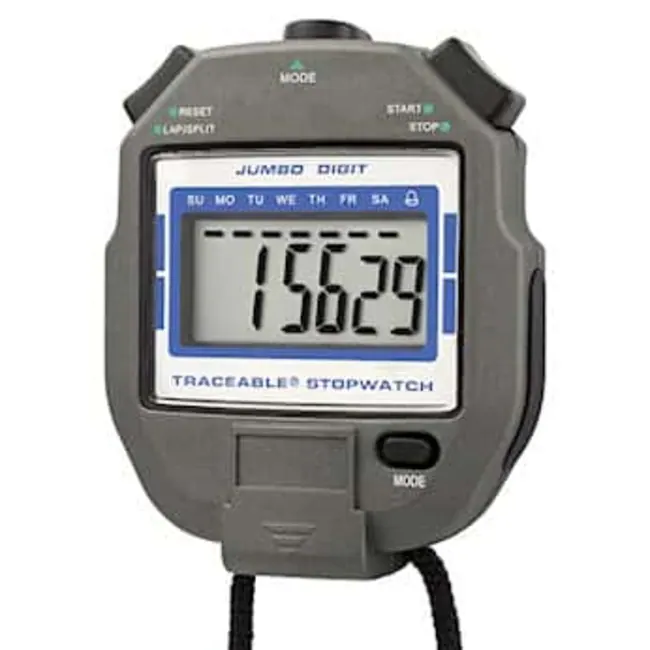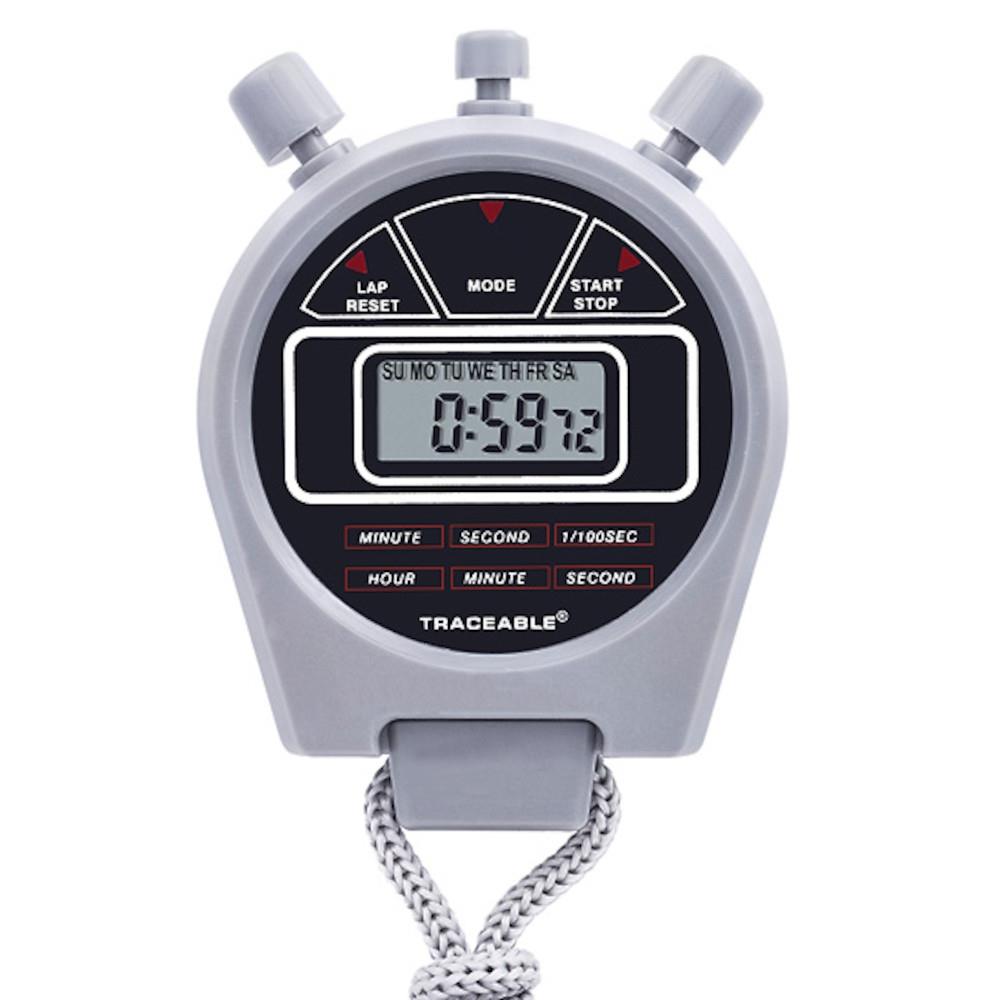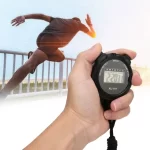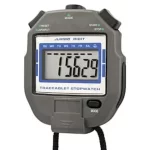Introduction to Calibrated Stop Watches
Calibrated stop watches are precision tools. They accurately measure time to the fraction of a second. These devices are vital where exact timing is critical. Sports, science experiments, and industrial work often use them. A calibrated stop watch goes through a process. This process sets it to match a standard time. It ensures the stopwatch’s accuracy.
Professionals prefer calibrated stop watches for their reliability. These watches differ from regular stop watches. They offer more precise timekeeping. Their design often includes advanced features. These features support stringent timing requirements.
A calibrated stop watch can be digital or analog. Digital types display time in numeric format. Analog types show time with a clock face and hands. Both types can be calibrated. However, the process might differ.
Choosing the right calibrated stop watch is essential. It depends on your specific needs. Some need a watch with a straightforward display. Others might need advanced functions. Calibration assures that regardless of the features, time is always accurate.
In this blog, we cover what makes these stop watches so special. We explore key features and how to choose the right one. We also discuss types, brands, and how to maintain accuracy. Lastly, we will understand certification standards. Let’s dive into the world of high-precision timing.
Key Features of High-Precision Stop Watches
High-precision calibrated stop watches come packed with essential features. These ensure performance and reliability. Here are the key features to look out for:
- Accuracy: The main feature of a calibrated stop watch is its accuracy. It measures time to fractions of a second. This precision is crucial for many professional applications.
- Durability: High-quality materials make these watches robust. They withstand regular use and harsh conditions.
- Water Resistance: Many calibrated stop watches offer water resistance. This adds to the watch’s versatility in different environments.
- Memory Function: Advanced models store split times or lap times. This is useful for reviewing past measurements.
- Display Readability: A clear, easy-to-read display is vital. Whether digital or analog, reading the time quickly is important.
- User Interface: An intuitive user interface makes operation simple. Buttons should be responsive and easy to use.
- Battery Life: Long battery life is essential for reliability. No one wants their stop watch to fail during crucial timing.
- Certification: A certification indicates that the watch meets specific standards. It’s a mark of quality.
These features combine to make a stop watch not just a timer, but a dependable tool. A calibrated stop watch with these features fulfils the needs of professionals across many fields. Whether it is for sporting events, laboratory experiments, or industrial tasks, the importance of a high-precision stop watch cannot be overstated. When choosing a calibrated stop watch, consider how these features align with your specific requirements.
The Importance of Calibration in Stop Watches
Calibration in stop watches is key for precise timekeeping. It corrects any deviations from standard time. This is vital in fields where exact timing matters. Imagine a track event. Even a slight error can change the race outcome. Calibration ensures fairness and accuracy in these scenarios.
In professional settings, accurate time measurement is critical. It can impact experiment results or industrial processes. Without calibration, the reliability of a calibrated stop watch drops. Users need to trust their timing tools. This trust comes from knowing the device meets strict standards.
During manufacturing, watches may have small differences. Calibration adjusts for these. It aligns each watch with an accepted time standard. This standard is often set by national or international institutes. They use atomic clocks to maintain time with extreme accuracy.
Regular calibration is also needed. Over time, a watch’s accuracy can drift. Factors like temperature changes or wear and tear affect it. Recalibration brings it back to correct timing. This ensures that a calibrated stop watch remains a precision tool.
In summary, calibration is what sets these stop watches apart. It guarantees that the time measured is dependable and exact. For anyone requiring exact timing, a calibrated stop watch is indispensable. It makes sure that everyone is on the same precise second.
How to Choose the Right Calibrated Stop Watch
Choosing the right calibrated stop watch is crucial for precision timing. Here’s how to decide which watch is best for you:
- Identify Your Needs: Reflect on why you need the watch. Sports, lab work, or industrial tasks all have unique requirements.
- Assess the Features: Return to the key features. Decide which ones are essential for your tasks. Accuracy and durability may top your list.
- Consider Display Type: Choose between digital or analog. Digital watches offer precise readings. Analog watches provide a classic look and feel.
- Think About Use Cases: If you work with water, pick a water-resistant watch. For repetitive timing, memory function is key.
- Ease of Use: Ensure the user interface is straightforward. You should be able to operate it easily under different conditions.
- Check Battery Life: Opt for watches with long battery life. Consistent performance is vital during important events.
- Look for Certification: Certification indicates standard compliance. It assures quality and reliability in your calibrated stop watch.
Take your time when selecting a calibrated stop watch. It’s an investment in precision. A well-chosen stop watch will serve you reliably in every critical timing situation.
Types and Brands of Calibrated Stop Watches
When it comes to calibrated stop watches, there are several types and brands to consider. Each offers unique features that cater to different professional needs. Below is a breakdown of the common types and some notable brands known for their quality calibrated stop watches.
- Digital Calibrated Stop Watches: These watches offer numeric displays and are prized for their precise readings. They often come with additional features like memory functions and are ideal for lab work where exact measurements are crucial.
- Analog Calibrated Stop Watches: Preferred for their traditional look, these have a clock face with hands. They are suitable for users who appreciate a classic design without compromising on precision.
- Water-Resistant Calibrated Stop Watches: These are designed to function in wet conditions without losing accuracy. They are perfect for aquatic sports or outdoor activities.
Some top brands that specialize in calibrated stop watches include:
- Casio: Known for durable and reliable electronics, Casio’s calibrated stop watches are popular in various professional settings.
- Seiko: A brand synonymous with precision, Seiko’s stop watches meet the demands of time-sensitive tasks.
- Timex: Offering a wide range of stop watches, Timex combines functionality with user-friendliness.
- Omega: Their high-end stop watches are often used in sporting events that require utmost accuracy.
When selecting a calibrated stop watch, take into account the type and brand reputation for quality. Each brand has its strengths, so choose one that aligns with your specific needs and offers the assurance of precision you require.
Maintaining Accuracy: How to Care for Your Calibrated Stop Watch
Proper maintenance is key to ensuring your calibrated stop watch retains its accuracy. Here are some tips on how to care for your precision timing device:
- Regular Calibration: Check your watch’s calibration regularly. Send it for professional recalibration as suggested by the manufacturer.
- Clean Carefully: Keep the watch clean. Use a soft, dry cloth to wipe away dust and moisture. Never use harsh chemicals.
- Avoid Extremes: Protect your stop watch from extreme temperatures and shocks. These can affect its performance.
- Store Safely: When not in use, store your stop watch in a stable environment. Preferably, keep it in a padded case.
- Handle with Care: Use your calibrated stop watch gently. Avoid pressing buttons too hard or tossing it around.
- Change Batteries: For digital models, replace batteries before they run low. This prevents loss of function at critical times.
- Check Water Resistance: If your watch is water-resistant, test this feature periodically. Seals can wear out, so maintenance is important.
By following these simple steps, you can extend the life of your calibrated stop watch. It guarantees it continues to provide the precise timing needed for your professional activities. Remember to consult the user manual for specific care instructions related to your particular stop watch model.
Calibrated Stop Watches in Professional Settings
Calibrated stop watches play a crucial role in various professional fields. In sports, for example, coaches and referees rely on them to record exact times. These watches help determine winners in close competitions. Precision is key, and a calibrated stop watch ensures fairness and efficiency.
In the scientific community, researchers use these watches for experiments. Timing can affect outcomes in chemistry or physics studies. Exact measurements are crucial for replicating experiments and verifying results.
Industrial settings also benefit from calibrated timing devices. Manufacturing processes often require coordinating multiple tasks within specific times. Quality control depends on the precise timing that calibrated watches provide.
Medical professionals use calibrated stop watches too. They time procedures and track patients’ vital signs with them. These watches support accurate diagnosis and care.
In each of these settings, the calibrated stop watch is more than a timekeeper. It’s a tool for accuracy, a benchmark for fairness, and a means to uphold the integrity of critical processes. Choosing the right type of calibrated stop watch, as covered earlier, is necessary for each professional area. Remember, your needs dictate the best stop watch for your specific tasks. Whether it’s water resistance for aquatic sports or memory functions for lab experiments, the right calibrated stop watch upholds precision across all professional settings.
Understanding the Certification Standards for Calibrated Stop Watches
Certification standards for calibrated stop watches are critical. They ensure the watches meet strict accuracy guidelines. Manufacturers must adhere to these standards to maintain trust and reliability. This section will explain why these standards matter and how they affect your choice of a calibrated stop watch.
Certification standards verify a stop watch’s precision. They come from respected authorities. These authorities set the benchmarks for timekeeping devices. The certification process involves rigorous testing. Watches are compared to atomic clocks for accuracy. Only those that pass earn the certification. This gives users confidence in their timekeeping tools.
For professionals, choosing a certified calibrated stop watch is non-negotiable. It’s an assurance. They can trust the device to function as expected in critical moments. This seal of approval is vital in competitive sports, scientific research, and industry applications.
Here are key points to remember about certification standards:
- Authority Approval: Look for watches certified by known authorities.
- Testing Rigor: Understand the testing processes watches undergo.
- Trust and Reliability: Know that certification equals trustworthiness.
- Regular Updates: Make sure the watch continues to meet current standards.
In selecting a calibrated stop watch, always consider if it carries certification. This certification ensures the device’s capability to perform at the highest level of precision. It’s a mark of excellence and a requirement for professionals needing uncompromised accuracy.





